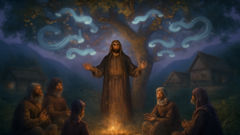Introduction
When dusk settles over the Armenian highlands, a hush falls upon the land. The wind weaves through ancient forests, stirring the wildflowers that cling to the slopes of Mount Aragats and whispering secrets down the cobbled lanes of old villages. In these quiet moments, the world feels as if it is holding its breath, and those who listen closely might sense a presence older than memory, woven into the stones and streams themselves. For centuries, Armenians believed that unseen eyes watched over their hearths and holy places, taking the form of Shahapet—guardian spirits, often seen as luminous serpents, who protected homes and sanctuaries from harm. Their legends shimmer in the shadows, wrapped in the scent of woodsmoke and the flicker of candlelight, carried from generation to generation like a precious talisman.
The Shahapet were not spirits to be feared, but revered—symbols of wisdom, protection, and the delicate balance between nature and humankind. It was said their presence could be felt at sacred springs, in the hollow of ancient trees, or beside the hearthstone where families gathered each night. Children grew up listening to stories of how Shahapet would reveal themselves to the deserving in moments of great need, appearing as radiant serpents with emerald eyes and scales that glimmered like moonlit water. Villagers left gifts of bread and honey by their doors, and elders offered prayers at dawn, for to honor the Shahapet was to honor the spirit of the land itself.
Yet legends are never just memories—they are warnings, promises, and sometimes, the last hope when darkness threatens. In a time when Armenia’s borders bristled with danger and the forests were no longer safe after sunset, one orphaned boy’s courage would awaken the ancient bond between guardian and mortal. Through hardship, wonder, and the wisdom of serpents, he would learn that the greatest protection comes not from might, but from the understanding of what must be cherished. So begins the story of Garegin and the Shahapet, a tale shaped by mountain winds and the enduring heart of Armenia.
I. Whispers Beneath Mount Aragats
Garegin had always belonged more to the forests than to the village. He was born on a winter night when a white fox circled his family’s hut three times before vanishing into the storm. His mother died giving birth, and his father, a woodcutter, followed soon after, lost to a fever that swept through the valley. Left alone, Garegin learned to read the secrets of wind and leaf, to find berries beneath the snow and fish in the icy streams that ribboned down from Mount Aragats.

He was an odd sight in the village of Lchashen—thin, quiet, eyes too large for his face. The other children whispered that he spoke to shadows and could charm snakes from their holes. The truth was, Garegin found solace in solitude and in the company of creatures who lived on the edge of sight. He slept in the loft above the old smithy, and each morning, he carried water for the baker’s wife in exchange for crusts of bread.
On the night the story truly began, the moon hung low and red above the fields. Garegin was returning from the forest, arms full of kindling, when he heard voices carried on the wind—sharp, urgent, not of this world. At the edge of the woods, where the earth rose into a mossy knoll crowned with wildflowers, he saw something move. A serpent, larger than any he had ever seen, slid from the roots of an ancient apricot tree. Its scales shimmered with the light of stars, and its eyes glowed a deep emerald. Garegin froze, but the serpent regarded him not with hunger, but with a gaze as old as stone itself.
“Do not fear,” a voice echoed—not aloud, but inside his mind. “You have honored this place with your silence and respect. We are Shahapet, guardians of hearth and field.”
Garegin knelt, setting down his bundle. He remembered the stories his grandmother used to tell, of how offerings of milk and bread would bring blessings to a home. Hesitantly, he broke off a piece of bread from his pouch and laid it on a flat stone. The serpent inclined its head, tongue flickering, and a ripple of light traveled down its body.
“You see us because your heart is still open,” the Shahapet whispered. “Darkness stirs beyond these hills. Remember what you have seen, and hold fast to hope.”
With that, the serpent vanished into the roots, leaving behind a faint glow that lingered long after the moon had set.
The next morning, unease swept through the village. Sheep had gone missing from the pastures, their tracks lost in a tangle of brambles. The elders muttered about wolves or thieves from across the river, but Garegin remembered the warning in the Shahapet’s eyes. He gathered herbs and left small offerings at the threshold of his loft, whispering thanks to the unseen protectors. The baker’s wife watched him with suspicion, while her old mother nodded knowingly.
As days passed, fear grew. One evening, firelight flickered on distant hills—an enemy warband, their torches snaking through the darkness like a river of embers. The villagers gathered in the church, clutching what little they had. The priest spoke of faith, but worry gnawed at every heart. When a stone crashed through the window and the night erupted in panic, Garegin slipped out into the cold.
He ran to the mossy knoll and called softly, not with words, but with a longing from deep within his chest. For a moment, all was silent. Then the serpent appeared again, coiling around the ancient roots. Its eyes were sad, yet resolute.
“The land is threatened. The bond between us and your people has grown thin,” the Shahapet said. “There is a place, deep in the forest, where our strength is rooted. You must find it and restore what has been lost.”
The serpent pressed its head to Garegin’s hand, leaving a trace of warmth that traveled up his arm. “Trust in the old ways, and let your heart guide you.”
With dawn still far away and danger encroaching, Garegin set out beneath the vast Armenian sky, following the whispers of the Shahapet into the shadowed heart of the world.
II. The Sacred Spring and the Covenant
Garegin’s feet moved silently over the leaf-strewn forest floor, every sense sharpened by fear and wonder. He followed animal trails up narrow ravines, past stands of oak and hornbeam where deer bedded down and the air smelled of damp earth and leaf mold. Above him, the stars faded and morning light bled slowly into the world. Each step felt guided, as if unseen hands turned branches aside and led him deeper into the heart of Armenia’s oldest woods.

He came at last to a clearing where the land dipped and the trees arched overhead, forming a living cathedral. In its center bubbled a spring so clear that even the sky seemed to pause and gaze down into its depths. The banks were thick with violets and wild mint, and at its edge stood a stone altar—ancient, lichen-crusted, half-buried by centuries of moss.
Garegin approached, feeling the air hum with a presence both alien and familiar. The surface of the water rippled though no wind blew. Then, like sunlight breaking through clouds, a host of serpentine figures shimmered into view. Each Shahapet was unique—one silver as moonlight, another coppery-red, a third as green as new grass. They circled the altar and the spring, their eyes reflecting the dawn.
“Welcome, child of Armenia,” they intoned as one, their voices blending like river stones beneath water. “The land remembers those who remember it. For many seasons our power has waned; few honor the old ways. The darkness that threatens your village is not only men with torches, but the forgetting of what holds the world together.”
Garegin’s voice trembled but did not break. “How can I help? I am only one, and I have nothing.”
The largest serpent—its scales shifting from indigo to gold—uncoiled and rested its head near his feet. “You have heart, and that is enough. To renew our covenant, you must carry water from this spring to your village and anoint the hearth of every home. In return, we will shield your people, but only if they remember to give thanks—to each other, to the land, and to us.”
Garegin knelt and filled his flask, cradling it as if it held light itself. The Shahapet began a low song, a sound older than language, winding through the trees like mist. As they sang, Garegin saw visions—fields golden with grain, children dancing around bonfires, laughter rising from every doorway. He also saw flames, war, and a world where silence replaced song.
“Go quickly,” the serpents whispered as the sun rose over the clearing. “The balance is delicate. Guard it with your life.”
Garegin raced back through the forest, clutching the flask so tightly his knuckles whitened. He reached Lchashen just as the first rays of sunlight struck the rooftops. The village was quiet; fear hung heavy in the air. But when Garegin entered the first home and sprinkled water on the hearthstone, a soft glow blossomed, banishing shadows from every corner. The old grandmother gasped and crossed herself, while the children watched in awe.
One by one, Garegin visited each house. At every threshold, he murmured thanks to the Shahapet and to those who had come before. The villagers followed him at first with suspicion, then with hope, and finally with tears. When he returned to the square, he found the priest waiting beside a flame that would not go out, no matter how the wind howled.
That night, as darkness pressed in and the warband circled ever closer, a shimmering barrier surrounded Lchashen. The enemy saw lights moving through the fields—great serpents whose scales flashed like shields and whose eyes burned with an ancient fire. Terrified, they turned back, convinced the village was guarded by spirits too powerful to challenge.
Inside the walls, families gathered and sang songs forgotten for generations. The bond had been restored, but the lesson remained: protection demanded not just ritual, but remembrance. Garegin knew he would never be alone again—for where gratitude lingered, so too did the Shahapet.
III. The Wisdom of Serpents
Time passed in Lchashen, but the memory of that night did not fade. Word spread to neighboring villages, and soon people came from across the valleys seeking guidance, protection, or simply to leave a piece of bread at the edge of the forest. The Shahapet’s favor brought prosperity: crops flourished, disease waned, and children grew up strong beneath their watchful eyes.

Garegin, once an orphan shunned for his quiet ways, became a bridge between worlds. Elders consulted him before planting or building new homes. He learned the language of birds and the secrets of healing herbs from the Shahapet, who appeared to him in dreams or when moonlight danced on the river’s surface. Under their tutelage, Garegin’s wisdom deepened, but so too did his understanding of the fragile balance that held the world together.
He noticed how easily people forgot when times were good. Offerings grew fewer, prayers shorter, and quarrels more frequent. Some whispered that prosperity had nothing to do with spirits or springs, but with hard work alone. Garegin tried to remind them—quietly, without scolding—that gratitude was not superstition but a way of weaving themselves into the land’s story.
One autumn, a drought struck the region. Streams shrank to muddy trickles, and fields cracked beneath an unrelenting sun. Fear returned like an old wound. The villagers clamored for Garegin to intercede, demanding miracles as if he controlled the rain. Distraught, he sought counsel at the sacred spring.
The Shahapet awaited him, their scales duller now, their voices tinged with sadness. “Balance is not given, but earned,” they said. “We shield those who honor what is entrusted to them—not only in ritual, but in how they treat each other and the world.”
Garegin realized then that true protection was not magic alone, but the wisdom to cherish, nurture, and share. He gathered the villagers beneath the ancient apricot tree and spoke with newfound authority. “The Shahapet cannot help us if we abandon each other. Let us dig wells together, share what little food we have, and heal old grievances.”
Slowly, something shifted. The people remembered how their ancestors had survived harder times—not by waiting for miracles, but by working hand in hand, guided by reverence for all life. Children fetched water for the elderly; neighbors traded what they could spare. Prayers became songs once more, full of hope and humility.
When the first rain finally fell, it was gentle and persistent, soaking into roots and reviving the spring. That night, luminous serpents were seen winding through fields thick with dew, their scales bright as polished gems. The Shahapet had not left; they had simply waited for hearts to open again.
Conclusion
Years melted into decades. Garegin’s hair silvered, but his eyes remained clear—a living reminder of the time when darkness had nearly swallowed his world. He watched as new generations grew up in the shadow of Mount Aragats, each child learning to greet the dawn with a whispered blessing, each family leaving bread for unseen friends by their doors. The Shahapet, ever watchful, became woven into the rhythms of village life: a gleam in the corner of an eye, a rustle in the grass at dusk, a feeling of safety when storms battered rooftops.
Yet Garegin understood that legends are not meant to be kept in glass; they live only so long as people believe and remember. He taught that wisdom is not hoarded but shared—like the spring that never runs dry so long as all drink from it. Even as old age slowed his steps, he found peace in knowing that every act of kindness, every song sung around a hearth, was a prayer echoing back to the guardians of Armenia’s spirit.
On his last evening, as twilight bled across the sky and the first stars appeared, villagers found him sitting on the mossy knoll where it had all begun. A luminous serpent rested at his side, scales shimmering with every heartbeat. They knew then that the cycle would continue—that so long as love, gratitude, and respect for the land endured, so too would the Shahapet. Their legend remained alive: not just in stories whispered by candlelight, but in every act that made a place sacred, and every heart that chose to remember.













